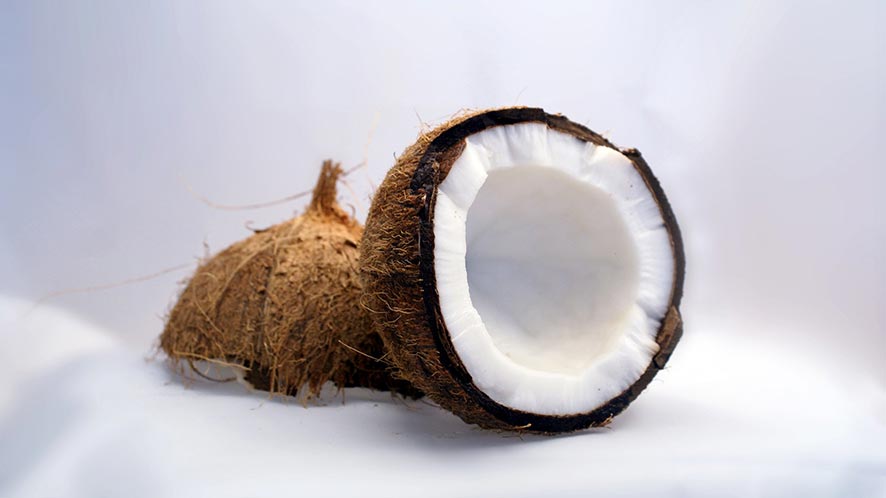Coconut Nutritional Value and 11 Health Benefits
Much in contrast to its name, coconut is a fruit that is derived from the coconut tree. The fruit has its origin in India, where it is cultivated on the sea beaches. Coconut received its name from a few Portuguese sailors of Vasco da Gama in India, who first brought them to Europe.
Since then, coconut oil has become the world’s leading vegetable oil up until the 1960s. The coconut palm is known as “the tree of life” because of its abundant uses. Not only can you eat its seed and drink its juice, but you can also use its fiber to make clothes and employ its leaves to make thatched roofs of small huts.
What’s more, even the fiber present in coconut shells can be put to use for making ropes. So, if you thought that coconut just served mankind with culinary uses, here’s a revelation. It is of utmost importance in commercial, industrial, medicinal, and household contexts.
In the lines below, we have provided details of the Coconut Nutritional Value and Health Benefits.
Coconut Nutritional Value and Facts
Amount of Coconut (shredded): 1 cup
Total Weight of Coconut: 80g
| Nutrients | Amount |
| Basic Components | |
| Protein | 2.7 g |
| Water | 37.6 g |
| Ash | 0.8 g |
| Phytosterols | 37.6 mg |
| Calories | |
| Total Calories | 283 |
| Calories From Carbohydrate | 49.7 |
| Calories From Fat | 224 |
| Calories From Protein | 9.2 |
| Carbohydrates | |
| Total Carbohydrate | 12.2 g |
| Dietary Fiber | 7.2 g |
| Sugars | 5.0 g |
| Fats & Fatty Acids | |
| Total Fat | 26.8 g |
| Saturated Fat | 23.8 g |
| Monounsaturated Fat | 1.1 g |
| Polyunsaturated Fat | 0.3 g |
| Total Omega-6 Fatty Acids | 293 mg |
| Vitamins | |
| Vitamin C | 2.6 mg |
| Vitamin E (Alpha Tocopherol) | 0.2 mg |
| Vitamin K | 0.2 mcg |
| Thiamin | 0.1 mg |
| Niacin | 0.4 mg |
| Folate | 20.8 mcg |
| Pantothenic Acid | 0.2 mg |
| Choline | 9.7 mg |
| Minerals | |
| Calcium | 11.2 mg |
| Iron | 1.9 mg |
| Magnesium | 25.6 mg |
| Phosphorus | 90.4 mg |
| Potassium | 285 mg |
| Sodium | 16.0 mg |
| Zinc | 0.9 mg |
| Copper | 0.3 mg |
| Manganese | 1.2 mg |
| Selenium | 8.1 mcg |

Health Benefits of Coconut
- As the coconut mostly grows on the seashore, rich iodine contents are found in coconut seed. Hence, the consumption of this fruit keeps away the probability of conditions like goiter and other iodine deficiency illnesses.
- Coconut is rich in bodybuilding content. As such, it is extremely essential for people who are lean and are looking forward to building a muscular body.
- Coconut comes as a savior for people with stomach and digestion problems. It is extremely beneficial in constipation, as it has laxative qualities and is equally good to be used when gas gets stuck in the stomach and intestines.
- The juice squeezed out of grated coconut seed, commonly called coconut milk is considered to be remedial during sore throats and is equally beneficial in relieving stomach ulcers.
- The oil extracted from dry coconut seed is considered to have medicinal effects in small cuts, sunburns, and burns. It is supposed to have a soothing effect on burns.
- Coconut oil is supposedly an effective moisturizer and is therefore recommended by massage therapists for the treatment of wrinkles. It makes the facial muscles supple and soft.
- Coconut oil is also considered a rich source of vitamin E. Consumption of two tablespoons of virgin coconut oil fulfills the minimum daily need for vitamin E in the body.
- Coconut water is considered easy to digest and hence is found good for kidney and urinary bladder problems.
- Coconut secretes coconut oil, which contains fatty acids, which, in turn, are supposed to play an anti-inflammatory role similar to fish oils.
- Freshly acquired coconut water is considered a vitalizing drink. It is useful as a rehydration drink for patients with diarrhea.
- If you are trying to get a slender body adding coconut to your diet will be of great help, as it increases metabolic activity and hence helps in burning those extra pounds off your body.
The fruit is a great source of vitamins, iodine, and minerals, but one can not overlook the fact that a large part of it is saturated fat and hence should be used judiciously while consuming. Else, it is a great food to revitalize your body!
Coconut: Nourishment Beyond the Body
Beyond nourishing the body, coconut extends its healing touch to external ailments. Its oil serves as a soothing agent for burns and sunburns, while also finding a place in skincare routines, lauded for its moisturizing and anti-aging properties.
The Culinary and Therapeutic Charm
From coconut milk easing sore throats to its water acting as a rehydration elixir for those suffering from diarrhea, this fruit’s versatility is truly remarkable. Embracing it in one’s diet not only aids in metabolism but also serves as a holistic approach to revitalizing the body.
The Balanced Approach to Coconut Consumption
While celebrating its virtues, it’s crucial to maintain a balanced perspective. Despite its rich nutritional content, the high presence of saturated fats necessitates a measured intake, ensuring its benefits are reaped without compromising overall health.
A Fruitful Conclusion
In essence, the coconut’s nutritional value and diverse health benefits unveil a holistic approach to wellness. Its contributions transcend mere sustenance, encompassing a spectrum of therapeutic, nutritional, and even industrial significance. Embracing this versatile fruit within the bounds of mindful consumption promises a revitalized path to well-being.
